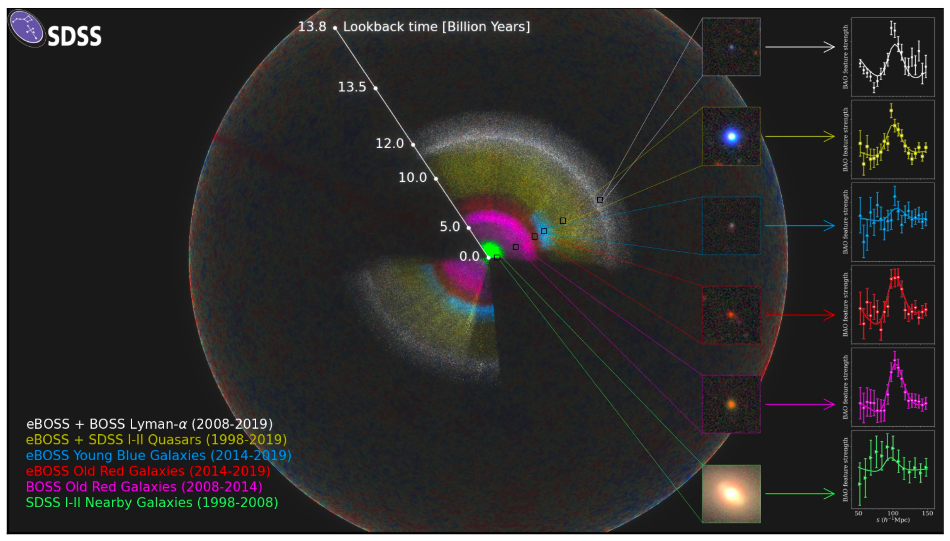Jul 20 2020
On July 20th, 2020, the extended Baryon Oscillation Spectroscopic Survey (eBOSS) collaboration reported a series of latest scientific results in more than 20 papers.
 The exploration of the Universe by the SDSS mission during the past two decades (1998-2019). Image Credit: eBOSS collaboration.
The exploration of the Universe by the SDSS mission during the past two decades (1998-2019). Image Credit: eBOSS collaboration.
The results include two research works on dark energy respectively headed by Professors ZHAO Gongbo and WANG Yuting from the National Astronomical Observatories of the Chinese Academy of Sciences (NAOC).
Prof. ZHAO and his colleagues used the eBOSS observations to successfully measure the history of the cosmic expansion and growth of the structure in a large volume of the early universe, corresponding to a distance range of 0.7 to 1.8 billion light-years away from the Earth. This is the first time that such a huge volume has ever been probed.
This study leveraged a technique known as “multi-tracer analysis,” which enables mitigating the observational systematics proposed and executed by Prof. ZHAO and Prof. WANG.
This work detected the existence of dark energy at a significance of 11 s, which is the strongest evidence ever on dark energy from galaxy surveys. The eBOSS observations are consistent with the dynamical dark energy probed by our team using the BOSS survey 3 years ago.
ZHAO Gongbo, Professor, National Astronomical Observatories, Chinese Academy of Sciences
Analysis of data is one of the most difficult challenges of the cosmological implications of galaxy surveys, specifically the development of new techniques to enhance the statistical accuracy and to mitigate the systematics. As the first-ever galaxy survey to observe galaxies of different kinds in a vast cosmic volume, eBOSS enables performing a multi-tracer analysis.
Cross-correlating multiple types of galaxies is an efficient way to reduce statistical uncertainties, with observational systematics mitigated at the same time, which is key to obtaining robust cosmological results.
WANG Yuting, Professor, National Astronomical Observatories, Chinese Academy of Sciences
ZHANG Weibing, a graduate student from NAOC, contributed to this study by developing a theoretical template for cosmological analysis.
I’m so happy that my theory work is recognized by the community.
ZHANG Weibing, Graduate Student, National Astronomical Observatories, Chinese Academy of Sciences
With dark energy dominating the existing universe, it is crucially vital to unravel its nature. Constituting more than 30 leading research institutes on astronomy across the globe, including NAOC, the eBOSS collaboration was founded to address the problem of dark energy.
The collaboration has been in operation since 2014 and has captured more than one million spectra in the redshift range of 0.6 < z < 2.2, as well as achieved a range of milestones in cosmology.
The eBOSS collaboration has completed its mission, but it is only a starting point of the next phase. The experience that eBOSS has given is crucial for cosmology with surveys of larger galaxies, which include the Dark Energy Spectroscopic Instrument (DESI), the Chinese Space Station Telescope (CSST), and Prime Focus Spectrograph (PFS).
This study was financially supported by the Natural Science Foundation of China, Ministry of Science and Technology of China, and the Chinese Academy of Sciences.